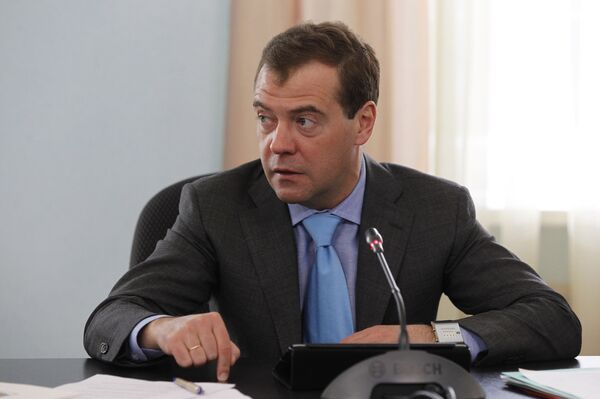President Medvedev admitted to a crisis of confidence in government among the Russian people on Thursday and called for dialogue at all levels to restore trust between society and officials.
Speaking at a meeting of his so-called Open Government forum, Medvedev also proposed a series of measures to increase transparency around the activities of civil servants and more honest privatization.
Members of the forum called for a new body to be set up to probe corruption among state officials.
Crisis
Speaking at a meeting of the working group for an open society, Medvedev said: "There is a crisis of trust between government and society and there always has been. The question is how deep is it," he said.
Medvedev went on to say that many people feel the government only worked for the sake of appearances.
"The recipe for regaining lost trust is conviction, openly talking, creating a dialogue," he said, adding this meant dialogue at all levels, including the highest government and ministerial levels, as far up as the presidential level.
Medvedev admitted that the first campaign to make income declarations of Russian state officials public had ‘zero effect.’
The president said he was ready to discuss conducting a second campaign but added that he was not sure whether “the second declaration campaign would be more effective than the first one.”
Databank
Medvedev proposed establishing an online resource that would provide information on action taken against state and government officials guilty of abuses and other misdemeanors.
The resource should provide up-to-date information, for example, on a government official charged with a crime, he said.
“We can write that the charges were dismissed for lack of evidence… or that he has been convicted,” Medvedev said.
That information should be available for all media outlets to publish at their discretion, he added.
He also proposed a higher level of publicity and transparency “for our open government and our state as a whole,” including the publication of tax declarations filed by all senior officials.
Exceptions will be made for top officials, such as the president, prime minister, cabinet members, governors, and some others, he added.
He warned, however, that public oversight of the income and spending by former government officials who have left the civil service for the business sector should not turn into a “witch hunt.”
Medvedev stressed that the presumption of innocence was key in publishing any information.
“We , from president to rural elder, are duty bound to respond to media publications. However, no one has abolished the presumption of innocence,” he said.
Corruption
Forum experts called for a new body to be set up to look into allegations of corruption among state and government officials.
It should be independent of other federal agencies and have the status a federal prosecutor’s office
The body should have the authority to suspend legislation if it is found to breed corruption, suspend officials under suspicion and offer witness protection programs, among other things.
“Experience shows that corruption in Russia cannot be eradicated in the current situation,” Sergei Aleksashenko, research projects director at the Higher School of Economics, said.
Despite President Dmitry Medvedev’s efforts to fight corruption, its level in Russia remains extremely high, with the country ranking 143rd out of 182 countries in Transparency International's 2011 Corruption Perceptions Index published in December 2011.
Medvedev also voiced the possibility of setting up a special judicial panel on corruption with the Supreme Court that will hear high-profile cases.
Experts say there is no sense in setting up such a panel, as it is completely unnecessary.
“There is no sense. We have a judicial panel on criminal and civil cases and what else do we need? Those working on this panel are well qualified for all cases, including corruption,” lawyer Vadim Kobzev said.
His colleague, Stanislav Akimov, said the proposed body would be excessive in addition to already existing anti-corruption bodies.
Privatization
Medvedev asked the government to work out a roadmap for privatization and less state interference in the country's economy.
"I absolutely support [the idea] of working out a roadmap for privatization to deregulate the economy," Medvedev said.
The Russian president also asked the government group to provide crowd sourcing to optimize business processes for the most important government services.
In his state of the nation address in December, Medvedev proposed setting up a wider government to address the country’s most urgent issues.
Under Medvedev's plan, open government would unite all levels and branches of power and incldue public figures prepared to participate in running the state, and the most important decisions and programs would have to be carefully scrutinized.
Medvedev also said the implementation of the current privatization program must be transparent.
"The current privatizations...must be absolutely open," he said. "The concept of justice is much more delicate. Open auctions should get maximum prices, that's justice."


